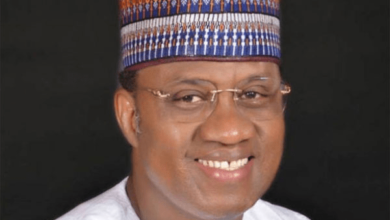The Senate request for Adjustment of Cash withdrawal limit from CBN

By G9ija

The Senate yesterday urged the Central Bank of Nigeria (CBN) to “considerably adjust its recent cash withdrawal limit policy in response to public outcry” against the policy.
The Upper Chamber also mandated its Committee on Banking, Insurance and Other Financial Institutions to “continue to embark on aggressive oversight of the (apex) bank on its commitment to flexible adjustment of the withdrawal limit and periodically report outcome to the Senate”.
It also resolved to “support the CBN in the continuous implementation of transformational payments and financial industry initiatives in line with its mandate in accordance with the CBN Act”.
These resolutions of the Senate followed its consideration and approval of the recommendations contained in a report by its Committee on Banks, Insurance and other Financial Institutions on the recent cash withdrawal limit of the apex bank.
The CBN, by the policy, placed a limit on cash withdrawals to N20,000 daily for Point of Sale POS) terminals; N100,000 weekly for private individuals and N500,000 for organisations and corporate bodies weekly.
But the policy has continued to generate criticisms from a cross section of Nigerians who believe that it is not only “punitive” but “unsustainable”.
The apex bank had said the move would help curb inflation, insecurity and corruption, apart from having a beneficial effect on the nation’s economy.
Some senators, in their contribution to the debate on the policy yesterday, opposed the policy, while others supported it.
Senators Yusuf Abubakar Yusuf, Francis Ailimikhena and Biobarakuma Degi-Eremienyo supported the policy and urged Nigerians to allow it to work.
But Senators Orji Uzor Kalu, Ajibola Basiru, Adamu Aliero, Muhammad Adamu Bulkachuwa, Biodun Olujimi, Hassan Hadejia, Chukwuka Utazi, Stella Oduah, Francis Fadahunsi and Kabir Barkiya, among others, opposed the policy.
Some of the opponents argued that even though the policy is targeted at the elites, it would have detrimental effect on the rural populace.
They insisted that the timing of the policy was wrong in view of upcoming general election and the quantum of money the candidates need for logistics during campaigns.
In his presentation, committee Chairman Uba Sani (APC Kaduna Central) had argued that the planned Cash Withdrawal Limit Policy was well conceived by the CBN for the transformation of the nation’s economy.
He noted that the CBN action fell within its mandate as provided for in sections 2(d) and 47 of its extant Act.
But during the general debate on its recommendations, many senators kicked against the timing of the policy, warning that it may lead to mass revolt in the rural areas.
Basiru (APC Osun Central) said the stipulated N100,000 and N500,000 withdrawal per week for individuals and corporate bodies were unrealistic.
Aliero (PDP Kebbi Central) said what the committee depicted in its report on the proposed CBN policy was an ideal picture of what an economy should be.
He said it was a far cry from what economy is, in reality in Nigeria.
Bulkachuwa (PDP Bauchi North) warned that the proposed policy, if not suspended, may trigger a revolt from rural dwellers.
Kalu (APC Abia North), who is the Deputy Chairman of the Committee on Banking, said he supported the report because he did not want to rock the boat.
He said: “N100,000 per week for individuals and N500,000 per week for corporate bodies, is too meagre. I recommend N500,000 per day for individuals and N3 million per day for corporate bodies, as being implemented in Abia, Lagos, Ogun, Rivers, FCT, etc. It should be sustained across the country for now,” he said.
Olujimi (PDP, Ekiti South) and Fadahunsi (PDP, Osun) kicked against the timing of the policy and called for massive enlightenment of Nigerians.
Oduah (PDP, Anambra) described the policy as draconian, saying: “Many rural communities in Nigeria have no internet networks. Without necessary infrastructure put in place, the policy will create more trouble.”




